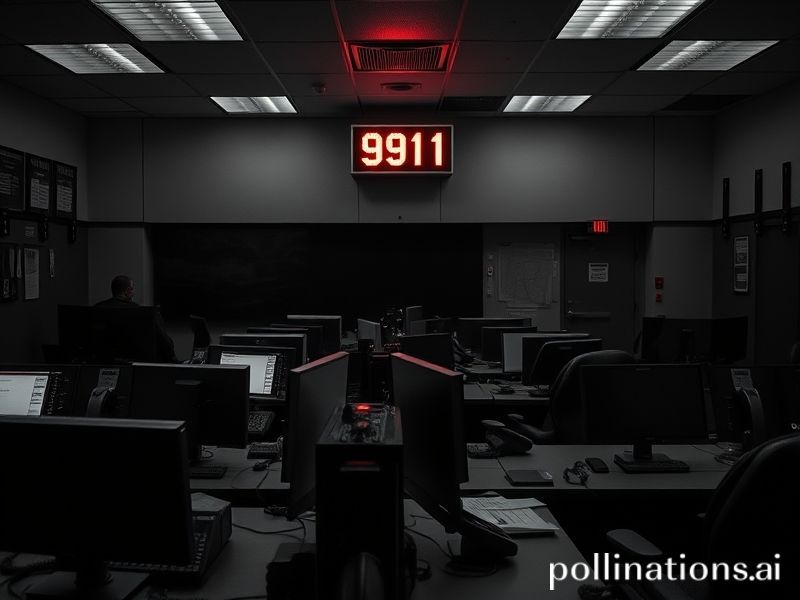Planet Earth Reacts to America’s 911 Face-Plant: A Global Tutorial on Panic Without a Hotline
The Day the World’s Panic Button Went Silent
By Our Man in the Cheap Seats, Somewhere Over the Atlantic
When the United States discovered that its 911 emergency lines had executed a synchronized face-plant this week, the rest of the planet did what it always does when America stubs its toe: winced, then checked its own shoelaces. Tokyo’s 110 kept ringing. London’s 999 politely queued callers. Lagos residents, long accustomed to dialing “any number you can remember plus prayer,” barely noticed. In short, the outage that paralyzed swaths of the U.S. was treated abroad less as a catastrophe and more as another episode of “America’s Got Infrastructure Problems,” the long-running reality show now in its twenty-third season.
Globally, the incident confirmed a suspicion that foreigners have harbored since the Y2K bug fizzled: the U.S. is simultaneously the loudest evangelist of resilience and the clumsiest practitioner. South Korean officials, whose nationwide emergency app once survived a K-pop fandom DDoS of biblical proportions, offered technical assistance with the diplomatic equivalent of a pat on the head. Meanwhile, the Swiss—who still route some alerts via carrier pigeon because “fiber is for optimists”—issued a travel advisory suggesting citizens in the U.S. “carry a whistle and a strong sense of existential acceptance.”
The outage’s ripple effects were predictably asymmetrical. Canadian border towns reported a 400 % spike in Americans asking whether “911 also works in metric.” Mexico quietly moved extra patrols to Tijuana in case frantic Californians tried to sprint south with sprained ankles. Across the Atlantic, EU regulators convened an emergency Zoom, ostensibly to “coordinate best practices” but mostly to reassure one another that, unlike Silicon Valley, they still remember what a landline is.
From an economic standpoint, the blackout was a masterclass in negative advertising for cloud migration. If the very system designed to save lives can be taken offline by what the Federal Communications Commission vaguely described as “a configuration error”—tech-speak for “someone probably clicked the wrong icon while eating a burrito”—then perhaps trusting the cloud with your vacation photos isn’t the existential leap it once seemed. Asian insurers, ever eager to sell cyber-extortion riders, now market a new product: “Civilization Rider Alpha,” which covers everything from ransomware to “oops, we turned off the ambulance.” Sales are brisk.
Of course, the outage also provided a refreshing reminder that human beings are endlessly inventive in the face of bureaucratic void. Texans formed spontaneous pickup-truck convoys to shuttle the wounded to hospitals, proving once again that nothing accelerates healthcare like a lifted F-150 with a Punisher decal. In Oregon, a rogue amateur-radio club resurrected the cold-war “Radio Free ER” net, while hipsters in Brooklyn offered to summon help via artisanal carrier pigeon—organic feed only, tips appreciated in crypto.
But the darker takeaway is geopolitical. Adversaries with a taste for asymmetry watched the chaos the way teenagers watch a rival’s house party on Instagram Live: taking notes. If a misclicked checkbox can mute the loukest scream for help in the world’s loudest country, imagine what a moderately motivated teenager in Minsk could do after three Red Bulls. NATO quietly updated its Tallinn Manual on cyber-war to include “accidental self-inflicted 911 outages” as a potential Article 5 gray zone—because nothing says “collective defense” like arguing whether fat-fingered sysadmins count as belligerents.
By day two, the lines were mostly back, the official apologies stacked like airline food trays, and the American public returned to its regularly scheduled doom-scroll. Elsewhere, the planet exhaled and updated its disaster bingo cards. Japan added “U.S. 911 down” next to “Godzilla El Niño.” France simply shrugged—if civilization can survive the Louvre’s Wi-Fi, it can survive anything—and uncorked another bottle.
In the end, the great 911 outage of 2023 will be remembered not for the lives imperiled—mercifully few—but for the snapshot it offered of a superpower whose emergency backbone is as brittle as its politics. The message to the world was clear: when America screams, sometimes the line just goes dead. The rest of us will keep our old rotary phones in the attic, right next to the canned beans and the last shred of faith in progress.







